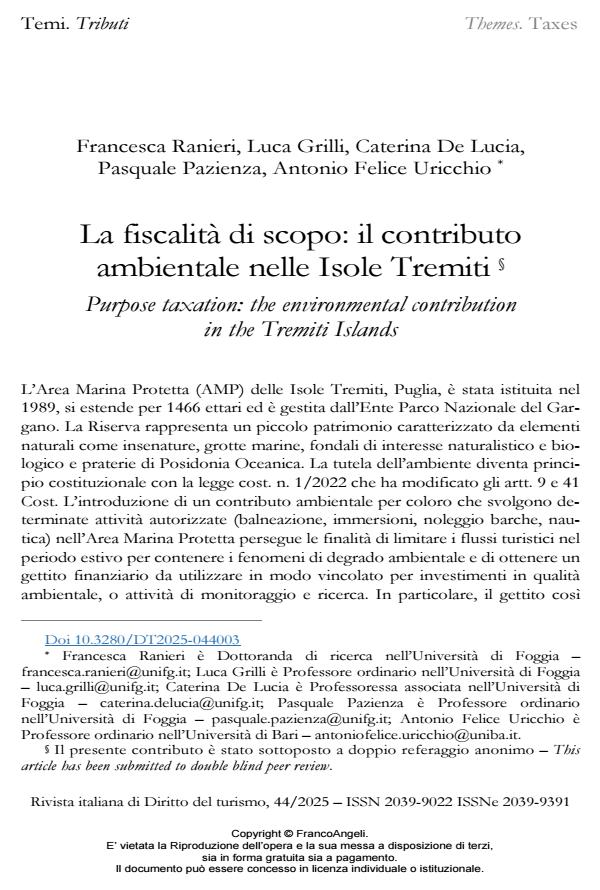Purpose taxation: the environmental contribution in the Tremiti Islands
Journal title RIVISTA ITALIANA DI DIRITTO DEL TURISMO
Author/s Francesca Ranieri, Luca Grilli, Caterina De Lucia, Pasquale Pazienza, Antonio Felice Uricchio
Publishing Year 2025 Issue 2025/44
Language Italian Pages 27 P. 45-71 File size 413 KB
DOI 10.3280/DT2025-044003
DOI is like a bar code for intellectual property: to have more infomation
click here
Below, you can see the article first page
If you want to buy this article in PDF format, you can do it, following the instructions to buy download credits

FrancoAngeli is member of Publishers International Linking Association, Inc (PILA), a not-for-profit association which run the CrossRef service enabling links to and from online scholarly content.
The Marine Protected Area (MPA) of the Tremiti Islands, Apulia, was established in 1989, covers 1466 hectares and is managed by the Gargano National Park Authority. The Reserve represents a small heritage characterised by natural features such as inlets, sea caves, seabeds of natural and biological interest and Posidonia Oceanica meadows. Environ-mental protection became a constitutional principle with Constitutional Law No. 1/2022, which amended Articles 9 and 41 of the Constitution. The introduction of an environmental contribution for those who carry out certain authorised activities (bathing, diving, boat hire, boating) in the MPA pursues the aims of limiting tourist flows during the summer period in order to contain the phenomena of environmental degradation, and of obtaining financial rev-enue to be used in a restricted manner for investments in environmental quality, or monitor-ing and research activities. In particular, the income may be paid by the providers of these services, through the Tremiti Municipality, to the Gargano National Park, as the manag-ing authority of the MPA, which may use it to repair the damage caused by these activities. This contribution represents a measure for the correction of environmental externalities and, even though it is not required by law, can be qualified as a tourist-environmental tax in the strict sense, also referred to as a tax with an environmental function, since the protection of the environment is not part of the taxable event, but it is its revenue that is tied up for the protection of the marine reserve. This contribution is in line with both the ‘polluter pays’ principle, which is at the heart of modern European environmental policy ex art. 191 TFEU, and the benefit principle. It is equal to the marginal costs of the damage caused by CO2 emissions from the individual activities authorised in the MPA.
Francesca Ranieri, Luca Grilli, Caterina De Lucia, Pasquale Pazienza, Antonio Felice Uricchio, La fiscalità di scopo: il contributo ambientale nelle Isole Tremiti in "RIVISTA ITALIANA DI DIRITTO DEL TURISMO" 44/2025, pp 45-71, DOI: 10.3280/DT2025-044003